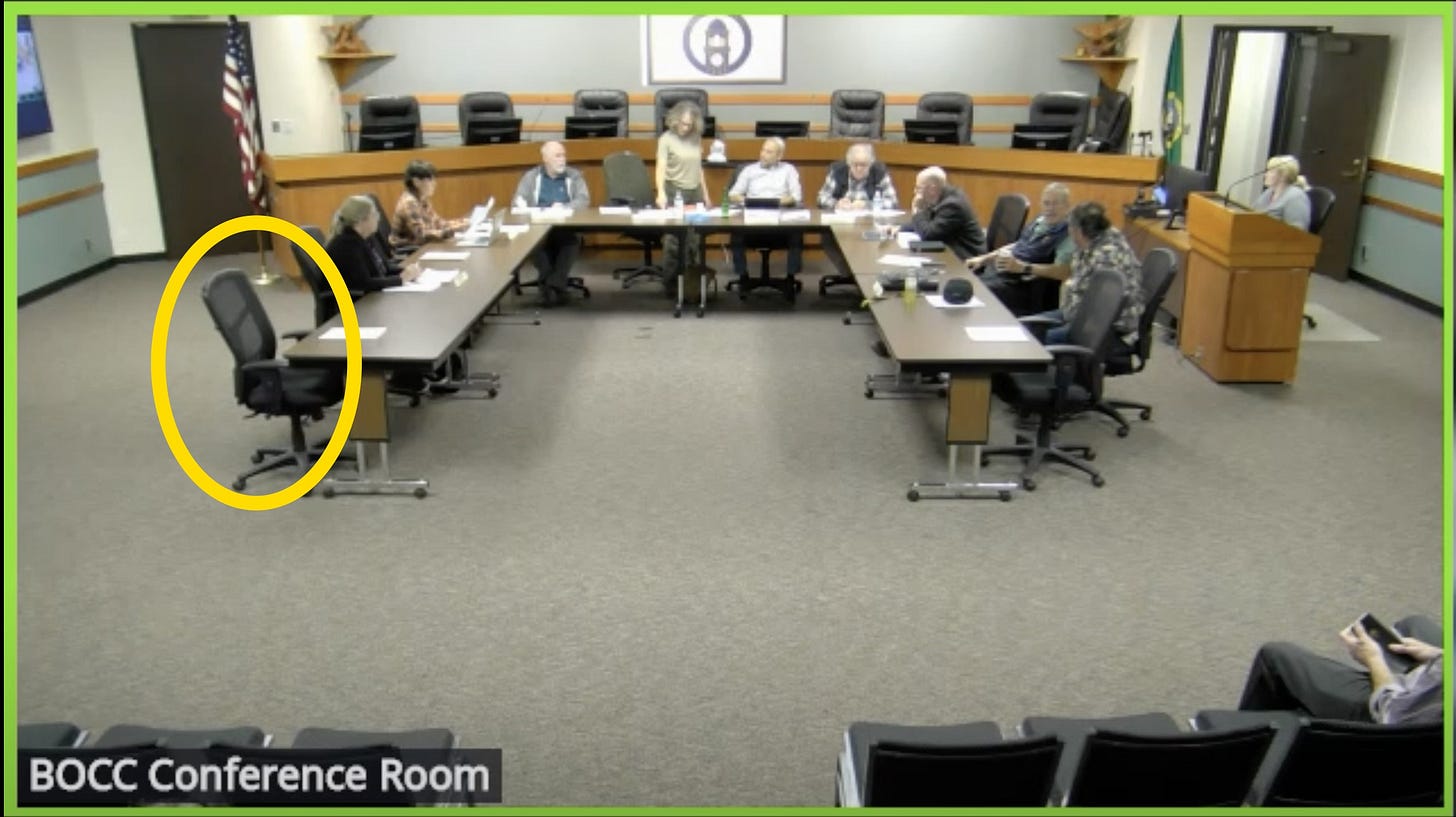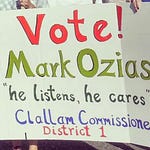Former County Commissioner Ron Richards says Clallam County is losing up to $3 million a year in tax revenue from Jamestown S’Klallam trust and exempt properties — yet county leaders refuse to even answer federal inquiries about the losses. While public safety and health programs face cuts, the County Commissioners are asking residents to raise their own taxes instead of addressing the growing tax gap.
At Monday evening’s Charter Review Commission meeting, Commissioner and former County Commissioner Ron Richards presented a detailed analysis showing what he believes to be a significant — and largely ignored — loss in county tax revenue due to tribal land exemptions.
According to Richards’ data, at least $1.1 million in property tax revenue is lost annually from about 208 parcels of land held in trust by the federal government for the benefit of the Jamestown S’Klallam Tribe. The figure was calculated using purchase prices and county appraisals from 2020 to 2024 — excluding the value of new construction or improvements.
But that’s just the beginning. Richards noted that additional revenue is lost from sales taxes, business and occupation taxes, vehicle license fees, and federal income taxes that do not apply to tribal entities. Factoring in these and other exemptions, he estimates the Tribe’s total tax savings at a minimum of $3 million per year — likely much more.
“Should this large figure, for a population of about 200 Clallam County citizens, be considered as sufficient savings for the Tribe and advanced as a reason to limit future additions to tribal trust lands?”
— Ron Richards, Charter Review Commissioner
A County in Denial
Clallam County’s total projected revenue this year is $54.2 million, about half of which comes from property taxes. Losing $1–3 million a year in potential tax revenue is not insignificant — particularly in a region already facing funding cuts to public safety, elections, and public health.
Meanwhile, the Jamestown Tribal Corporation reportedly earned nearly $86 million last year, aided in part by tax advantages unavailable to non-tribal businesses.
County officials told KONP Radio that recent trust land conversions represented only $19,000 in lost annual property taxes on $2.1 million worth of parcels — a figure which vastly understates the true impact because it counts only new conversions, not the entire inventory of trust and exempt properties.
This is a disingenuous comparison since the county doesn’t just collect property taxes from new parcels each year — it collects them from all properties, every year. The cumulative losses matter.
Letters Never Sent
Whenever the Bureau of Indian Affairs (BIA) considers converting land into tribal trust status, it first asks local governments for comments on the potential impacts — including lost tax revenue and changes to land-use authority.
Despite repeated opportunities, Clallam County has never submitted a formal response to the BIA regarding these conversions. Yet now, the same Board is asking residents to raise their own property taxes to cover a budget gap — avoiding difficult decisions about cutting unnecessary programs like the poet laureate initiative, boutique business grants, and luxury homeless housing amenities.
Richards’ proposed Charter amendment, if approved, would simply require the County to respond to these federal requests — ensuring transparency and accountability. Yet several charter review commissioners have resisted even this basic measure.
Tax Burden Math: A Simple Example
Commissioner Jim Stoffer, who served on Richards’ subcommittee before recently resigning from that group, claimed that removing taxable parcels from the rolls doesn’t shift the burden onto remaining property owners. That argument doesn’t hold up to basic math.
Imagine three houses in Clallam County. Each pays taxes to fund county services. If one of those houses stops paying, the schools, fire departments, and libraries don’t suddenly shrink their budgets — the other two houses simply have to cover the difference.
It’s a simple truth: when one property is removed from the tax base, everyone else pays more.
Claims of ‘Targeting’
Commissioner Alex Fane argued that Richards’ amendment targets minorities, though he did not explain how a corporation that brings in $86 million annually and dominates regional business could be considered a disadvantaged group.
This narrative — that scrutiny of tribal business practices equals racism — has become common in local government discourse, often repeated in annual proclamations condemning systemic racism by colonizers.
Charter Review Chair Susan Fisch argued that the proposed amendment unfairly targets tribes and should apply more broadly to other government land transfers, such as state parks or DNR lands. Richards clarified that his amendment already covers all entities, including federal and state acquisitions.
But there’s a key difference worth noting: state and DNR lands offer a genuine public benefit — recreation, camping, and even timber revenue that helps fund local schools and libraries. By contrast, most tribal-owned properties are closed to the public, including beaches, private gyms, private residences, and member-only facilities.
The sites that are open to everyone — the casino, the golf course, and the MAT clinic — are commercial ventures designed to generate revenue from the public, not to provide public benefit. In other words, the doors open to outsiders are the ones that bring money in.
The question isn’t whether the Tribe has the right to manage its land — it’s whether taxpayers should lose millions in potential revenue without receiving anything in return. Would you rather have Christmas lights in Blyn and press releases about “community partnerships,” or a fully staffed Sheriff’s Department? One costs more than the other, but only one keeps you safe.
A Decade of Silence
After years of inaction, the County Commissioners announced this year that they have sent a letter to the Jamestown Tribe requesting a conversation about trust land impacts. When pressed at Tuesday’s commissioner meeting, they first refused to provide an update on the letter — then admitted they’ve received no response from the Tribe after two months.
Commissioner Mark Ozias advised citizens to check future agenda packets if they want updates. The message was clear: don’t ask questions.
Ticking Clock
With only five meetings left in the Charter Review Commission’s schedule, Richards faces a race against time to advance his amendment so voters can have a say on the November 2026 ballot. The Ethics Committee, crafting an amendment to hold elected leaders accountable to the Code of Ethics, is in the same position, rushing to meet the deadline.
Commissioner Nina Sarmiento’s amendment requiring County Commissioners to hold public Q&A sessions with voters passed on Monday, and voters will likely vote on it next fall — proof, perhaps, that transparency still has a few allies left.
Security, Silence, and Spending
Meanwhile, the Commission quietly removed an agenda item to discuss private security hired for Commissioner Jim Stoffer. Emails reveal that thousands in taxpayer dollars have been allocated for Stoffer’s guard after he received criticism from the public.
That means there will be no discussion about whether Chair Fisch and Commissioner Ozias violated the Open Public Meetings Act by authorizing taxpayer-funded protection for a friend. Nor will the County explain why Administrator Todd Mielke misled the public about the policy.
Stoffer was absent Monday — but his security guard still attended, seated closest to his empty chair, and you paid for it.
A Fitting Symbol
That empty chair is a fitting symbol for Clallam County leadership today: no one wants to answer hard questions.
County officials demand more taxes from residents while refusing to account for millions in lost revenue, hidden decisions, and closed-door deals. Richards’ proposal doesn’t target anyone — it simply requires the government to do its job and respond when the public’s money and land are on the line.
In the end, when citizens can’t question their leaders but keep paying the price, silence becomes the most expensive thing of all.













